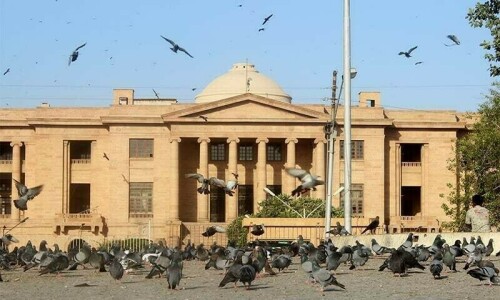ISLAMABAD: Although Prime Minister Nawaz Sharif arrived late by an hour, the National Assembly ignored controversy and dutifully began a legislative quick march on Saturday after receiving two government bills aimed to set up constitutionally protected military courts to try civilian terrorism suspects for up to two years.
One bill seeks to amend the constitution to bar challenges before the superior courts and fix a two-year limit for the new legislative measure, and the other to amend the Pakistan Army Act of 1952 to extend the scope of the proposed speedy trial military courts to try civilians charged with crimes of terrorism and extremism.
The Minister in charge of Law, Justice and Human Rights, Senator Pervaiz Rashid, introduced both the bills immediately after the house met one hour late, apparently because of the delayed arrival of the prime minister, and the house adopted, without any objection, his two motions to suspend a section of the rules of procedure and conduct of business to exempt the drafts from scrutiny by standing committees of the house so they could be passed on the next working day on Monday.
The unanimous adoption of the exemption motions by more than 100 members present in the 342-seat house had left no procedural hitch for the government to ask for passage of any of the two bills.
TWO-THIRDS MAJORITY: But the house was far short of the two-thirds majority – comprising 228 members – for the passage of the Constitution (Twenty-first Amendment) Bill – not the Constitution Twenty-second Amendment Bill as erroneously stated in an earlier draft given to media on Friday night – necessitating some hard effort by the government to collect the required number.
The whole legislative process regarding the two bills took just three minutes before the house was adjourned until 4pm on Monday, when the situation would not be much different if no debate is held and no amendment is taken up.
The quick work represented the consensus on the new framework reached at a conference of political leaders convened by the prime minister on Thursday that was also attended by Army Chief Gen Raheel Sharif.
The preambles to both the bills were largely identical, citing “extraordinary situation and circumstances” that they said demanded “special measures for speedy trial of certain offences relating to terrorism, waging of war or insurrection against Pakistan” and prevention of acts threatening the country’s security by “any terrorist or terrorist group using the name of religion or a sect and members of such armed groups, wings and militias”.
However, the Pakistan Army (Amendment) added two key new sub-clauses in the existing act describing people or groups that could be punished under the new law.
The sub-clauses (iii) and (iv), to be inserted in clause (d) of sub-section (1) of section 2, after sub-clause (ii) are:
(iii) Any person who is or claims or is known to belong to any terrorist group or organisation using the name of religion or a sect and raises arms or wage war against Pakistan or attacks the armed forces of Pakistan and law enforcement agencies, or attacks any civil or military installation in Pakistan or kidnaps any person for ransom or causes death of any person or injury, or is in possession, storage, fabrication or transport of explosives, firearms, instruments, articles, suicide jackets or vehicles designed to be used for terrorist acts, or receives or provides funding from any foreign or local sources for such illegal activities and acts or does any act to overawe the state or any section of the public or a sect or a religious minority or to create terror or insecurity in Pakistan or attempts to commit any of the said acts, within or outside Pakistan shall be punished under this act;
(iv): Any person who is or claims or is known to belong to any terrorist group or organisation using the name of religion or a sect, commits an offence mentioned at serial Nos. (i), (ii), (iii), (v), (vi), (vii), (viii)), (ix), (x), (xi) (xii), (xiii), (xv), (xvi), (xvii) and (xx) in the schedule to the Protection of Pakistan Act 2014 (X of 2014).
However, according to an official press release, the law minister sent a letter to the National Assembly secretary giving notice of an amendment to his draft bill to insert in the above-mentioned sub-clause (iv) to include any person who “raises arms or wages war against Pakistan” among those to be punished.
The bill explains that the expression “sect” would mean a sect of religion and “does not include any political party registered under any law for the time being in force”.
Published in Dawn, January 4th, 2015
On a mobile phone? Get the Dawn Mobile App: Apple Store | Google Play











































